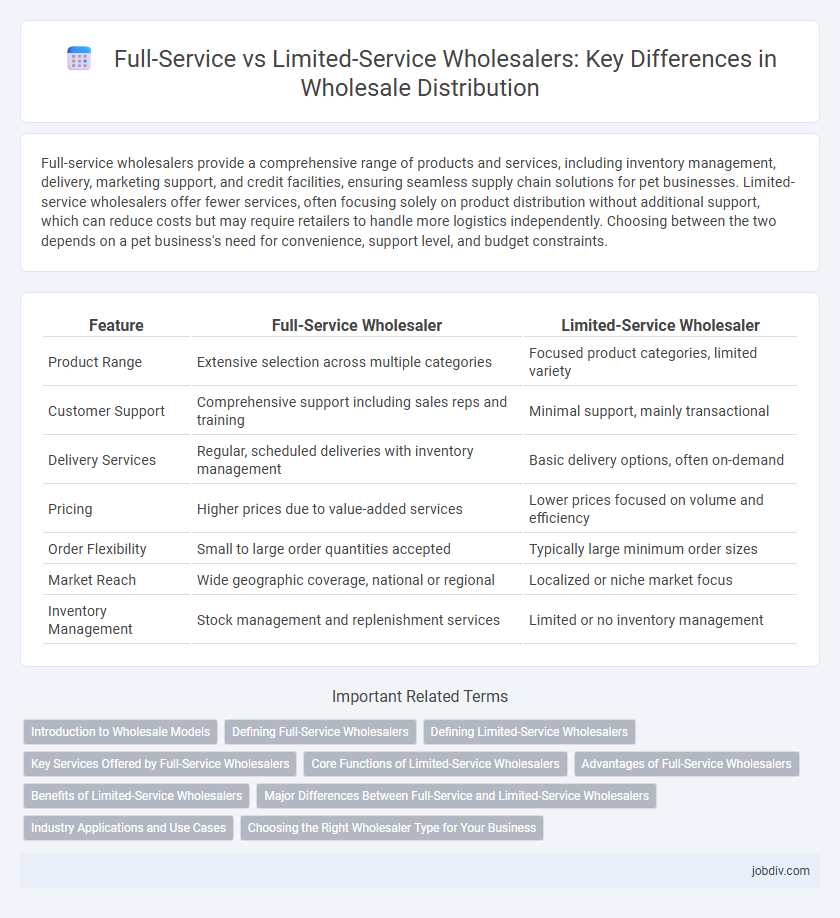Full-service wholesalers provide a comprehensive range of products and services, including inventory management, delivery, marketing support, and credit facilities, ensuring seamless supply chain solutions for pet businesses. Limited-service wholesalers offer fewer services, often focusing solely on product distribution without additional support, which can reduce costs but may require retailers to handle more logistics independently. Choosing between the two depends on a pet business's need for convenience, support level, and budget constraints.
Table of Comparison
| Feature | Full-Service Wholesaler | Limited-Service Wholesaler |
|---|---|---|
| Product Range | Extensive selection across multiple categories | Focused product categories, limited variety |
| Customer Support | Comprehensive support including sales reps and training | Minimal support, mainly transactional |
| Delivery Services | Regular, scheduled deliveries with inventory management | Basic delivery options, often on-demand |
| Pricing | Higher prices due to value-added services | Lower prices focused on volume and efficiency |
| Order Flexibility | Small to large order quantities accepted | Typically large minimum order sizes |
| Market Reach | Wide geographic coverage, national or regional | Localized or niche market focus |
| Inventory Management | Stock management and replenishment services | Limited or no inventory management |
Introduction to Wholesale Models
Full-service wholesalers offer a comprehensive range of services including inventory storage, product delivery, credit extension, and promotional support, making them ideal for businesses seeking end-to-end supply chain solutions. Limited-service wholesalers focus on specific functions such as cash-and-carry, truck delivery, or drop shipping, providing cost-effective options for buyers with streamlined needs. Understanding these wholesale models helps businesses optimize operational efficiency and align purchasing strategies with their logistical capabilities.
Defining Full-Service Wholesalers
Full-service wholesalers provide comprehensive services including inventory management, order fulfillment, delivery, and credit options, enabling retailers to focus on sales and customer engagement. They often offer a broad product assortment, logistical support, and marketing assistance, ensuring seamless supply chain operations. This contrasts with limited-service wholesalers who restrict their scope to specific functions like bulk breaking or cash-and-carry sales.
Defining Limited-Service Wholesalers
Limited-service wholesalers specialize in specific functions such as cash-and-carry, rack jobbing, or drop shipping, providing tailored distribution solutions without the full breadth of services offered by full-service wholesalers. They minimize operational costs by limiting services like inventory management, credit, delivery, and market information, making them ideal for businesses seeking cost-efficient supply chain partners. Their focused approach streamlines transactions and accelerates product turnover for manufacturers and retailers in various wholesale markets.
Key Services Offered by Full-Service Wholesalers
Full-service wholesalers provide comprehensive support including inventory management, product storage, order fulfillment, and credit services, ensuring a seamless supply chain experience. They offer marketing assistance and delivery services, facilitating efficient distribution tailored to diverse retailer needs. Their extensive product range and value-added services distinguish them from limited-service wholesalers who offer basic distribution functions only.
Core Functions of Limited-Service Wholesalers
Limited-service wholesalers concentrate on specific core functions such as bulk breaking, warehousing, and transportation, minimizing their role in activities like credit provision, marketing, or product assortment. They streamline operations to cater to businesses requiring fewer services, thereby reducing costs and enhancing efficiency in supply chain management. By focusing on these limited, essential functions, they provide targeted support within the wholesale distribution network.
Advantages of Full-Service Wholesalers
Full-service wholesalers offer comprehensive support including inventory management, credit, delivery, and marketing assistance, enhancing supply chain efficiency for retailers. Their extensive product range and personalized services ensure businesses receive tailored solutions, reducing operational burdens. By providing value-added services such as market insights and staff training, full-service wholesalers enable clients to boost sales and customer satisfaction effectively.
Benefits of Limited-Service Wholesalers
Limited-service wholesalers reduce operational costs by specializing in specific functions such as inventory management, thereby offering competitive pricing to retailers. Their streamlined services enhance efficiency and flexibility, allowing retailers to customize orders and reduce excess stock. This focus on core tasks enables faster turnaround times and improved inventory turnover, driving profitability for businesses.
Major Differences Between Full-Service and Limited-Service Wholesalers
Full-service wholesalers provide a comprehensive range of services including bulk breaking, inventory management, credit extension, marketing support, and delivery, enhancing supply chain efficiency for retailers. Limited-service wholesalers offer fewer services, concentrating primarily on either cash-and-carry operations, truck jobbing, or drop-shipping, which reduces overhead but limits customer support. The major differences lie in the breadth of services offered and the degree of logistical and financial assistance provided to retailers.
Industry Applications and Use Cases
Full-service wholesalers support diverse industry applications by offering comprehensive services including inventory management, marketing, and delivery, making them ideal for sectors like retail, manufacturing, and hospitality that require extensive supply chain support. Limited-service wholesalers specialize in specific functions such as bulk breaking or drop shipping, serving industries with narrower needs like automotive parts or specialized electronics where streamlined logistics reduce costs. Choosing between full-service and limited-service wholesalers depends on an industry's demand complexity, customization requirements, and operational scale.
Choosing the Right Wholesaler Type for Your Business
Choosing the right wholesaler type depends on your business needs, where full-service wholesalers offer comprehensive services like inventory management, delivery, and credit facilities, while limited-service wholesalers focus on specific functions such as cash-and-carry or drop-shipping. Full-service wholesalers provide greater support for businesses needing extensive logistical aid and customer service, ideal for companies with complex supply chains or large order volumes. Limited-service wholesalers suit businesses aiming to reduce costs by handling more operational tasks themselves, fitting smaller enterprises or startups with simpler product demands.
Full-Service Wholesaler vs Limited-Service Wholesaler Infographic

 jobdiv.com
jobdiv.com